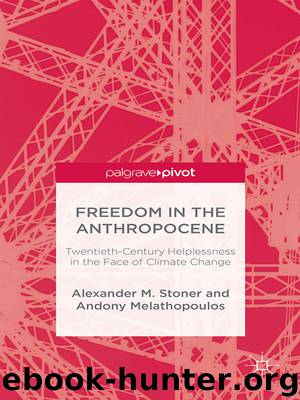Freedom in the Anthropocene: Twentieth-Century Helplessness in the Face of Climate Change by A. Stoner & A. Melathopoulos

Author:A. Stoner & A. Melathopoulos [Stoner, A.]
Language: eng
Format: epub
ISBN: 9781137503893
Publisher: Palgrave Macmillan US
Published: 2015-05-27T07:00:00+00:00
2.2 Toward a critique of contemporary environmentalism
Why did the rise of contemporary environmentalism, instead of attaining its objective, shift the problem to other registers?16 The answer to this question revolves around the identity between society and its discontents. Although the widespread discontents in the 1960s, including those expressed by the environmental movement, register the need for social transformation, it is through the identity thinking in these movements that such discontents are integrated into the capitalist system. With identity thinking, environmental discontents are used as the means to perpetuate capitalism. Consequently, without a critical, self-reflexive understanding of their own historicity, the capacity of these discontents to clarify social structure (and its entwinement with ecological degradation) is rendered impotent.
The emergence of what we call contemporary ecological subjectivity—a specifically post-WWII social conception and understanding of the natural environment17—was contingent upon the reconfiguration of post-WWII society and power relations and the ecological degradation this administered form of society facilitated. During the post-WWII, Cold War period, state managers increasingly viewed science and technology as the means for continual preparedness for war. This corresponds to what McLaughlan (1992) describes as a shift from “geopolitics” to “technopolitics” in which control of technology becomes the primary means for exercising and expanding state power. Similarly, scholars have detailed the ways in which Cold War military–industrial complexes produced the knowledge that facilitated the unprecedented expansion and control of the planet during this time (Doel, 2003; Edwards, 2010, 2006; McNeill and Unger, 2010).18 Indeed, as these researchers are keen to point out, the sophisticated nature of our contemporary understandings of the biophysical world is one of the most significant, yet often overlooked, effects of the Cold War.
The connections between the Cold War boost in scientific knowledge, ecology, and the emergence of contemporary environmentalism in the late 1960s and early 1970s are intricate. According to Paul Edwards (2010, 1996), without this knowledge production, it is unlikely that awareness of global climate change would have occurred as rapidly as it did. Indeed, the tremendous increase in such knowledge production played a key role in facilitating what we refer to as contemporary ecological subjectivity, as many Cold War technologies would later play a significant role in establishing how we know what we know about global environmental problems (Taylor and Buttel, 1992).19
Download
This site does not store any files on its server. We only index and link to content provided by other sites. Please contact the content providers to delete copyright contents if any and email us, we'll remove relevant links or contents immediately.
| Anthropology | Archaeology |
| Philosophy | Politics & Government |
| Social Sciences | Sociology |
| Women's Studies |
Born to Run: by Christopher McDougall(7129)
The Leavers by Lisa Ko(6948)
iGen by Jean M. Twenge(5418)
Sapiens by Yuval Noah Harari(5374)
Spare by Prince Harry The Duke of Sussex(5199)
The Kite Runner by Khaled Hosseini(5183)
Machine Learning at Scale with H2O by Gregory Keys | David Whiting(4314)
Bullshit Jobs by David Graeber(4195)
Never by Ken Follett(3960)
Goodbye Paradise(3812)
Livewired by David Eagleman(3775)
Fairy Tale by Stephen King(3401)
A Dictionary of Sociology by Unknown(3085)
Harry Potter 4 - Harry Potter and The Goblet of Fire by J.K.Rowling(3074)
The Social Psychology of Inequality by Unknown(3034)
The Club by A.L. Brooks(2927)
Will by Will Smith(2924)
0041152001443424520 .pdf by Unknown(2846)
People of the Earth: An Introduction to World Prehistory by Dr. Brian Fagan & Nadia Durrani(2739)
